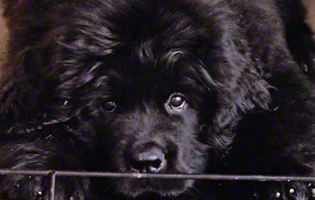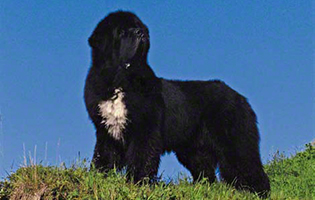by Jenny Zablotny, DVM
It is hard to believe that 10 months ago you brought home a 25 pound ball of fluff. Now you have a 120 pound, half-coated, gawky, uncoordinated, bundle of energy that won’t sit still and won’t stop chewing on things! How time flies! While this teenager may look more similar to an adult Newfoundland than that cute fuzzball at 8 weeks, they are far from adult dogs. They still have considerable maturing to do both mentally and physically.
Depending on the lines, your puppy has several more months of growing. Even if he doesn’t get any taller, the muscles and tendons have to catch up to the length that developed in the bones a few months ago. Newfoundland puppy structure is very loosely connected until they are 18 months of age or so. That combined with size and weight and energy increases the potential for permanent damage either from a single trauma or repetitive motions such as road work or pulling heavy loads. That doesn’t mean that you shouldn’t train or exercise your dog. Tired dogs have happy owners! If they aren’t stimulated or trained, they will find their own entertainment and that isn’t usually a good thing. The activities that you choose need to be moderate in duration as well as intensity. Learning to pull and maneuver an empty cart or training rig is mentally and physically stimulating, while not being overly strenuous. Pulling a load of firewood or even a couple of small children in a wagon requires conditioning for the average adult dog and is probably too much for a yearling. Other examples of appropriate exercise would include tracking, moderate swimming sessions (not to the point of exhaustion) and leash walks with short bursts of jogging or running. While exercise should be moderate, it also needs to be regular. “”Weekend Warrior” routines increase the risk of injury as most dogs (and their owners) aren’t conditioned enough for even moderate physical activity just on the weekends.
Regular, moderate exercise will allow you to keep your puppy safely in condition as he grows. Continue to feed for condition. Some Newfs, like their teenage human counterparts, will eat an astonishing amount of food and not gain an ounce. Life isn’t fair for dogs or humans! Six to eight cups of food a day wouldn’t be an uncommon intake for a yearling male. There are others that will look at food and gain ten pounds. How much they are eating at this age is heavily dependent on what is being fed, activity level, time of year, where they are kept (kennel dogs in the north in the winter vs. indoors in the south)… Some will feel terribly thin in spite of the amount that they are ingesting. That is OK as long as their activity level is normal and their stools are normal. They will eventually catch up and the amount of food needed to keep them in good body condition will gradually drop off.
Year old Newfoundland puppies may look full grown, but they are still maturing. Maintaining a balance between keeping them physically fit and keeping their still-developing structure safe isn’t easy, but will help ensure their orthopedic soundness as adults.

